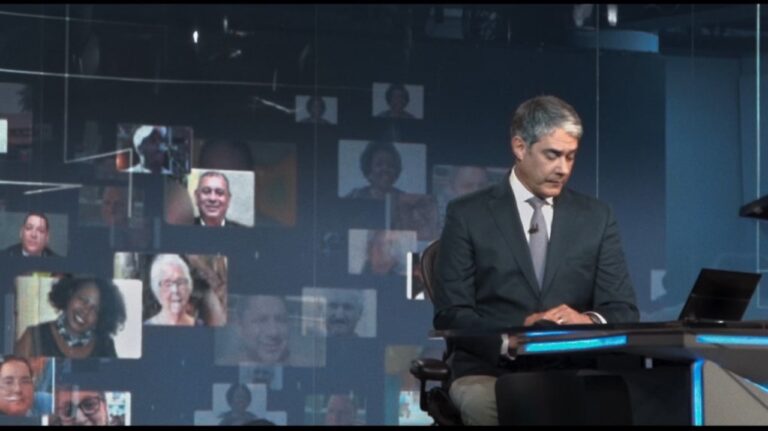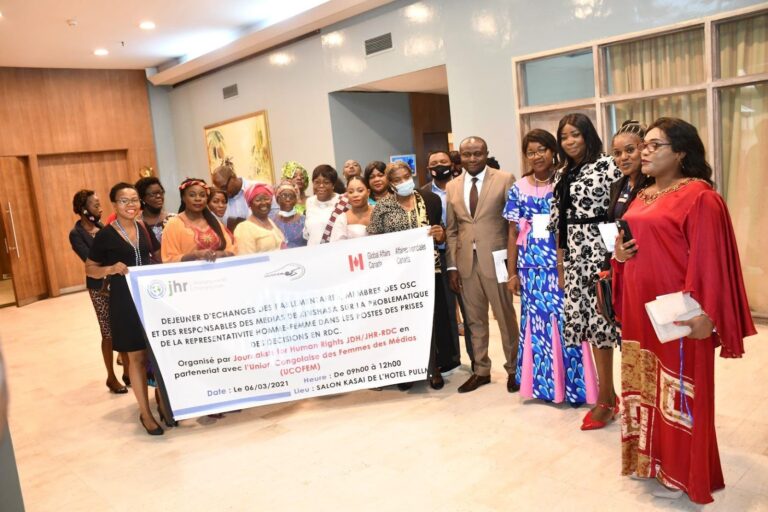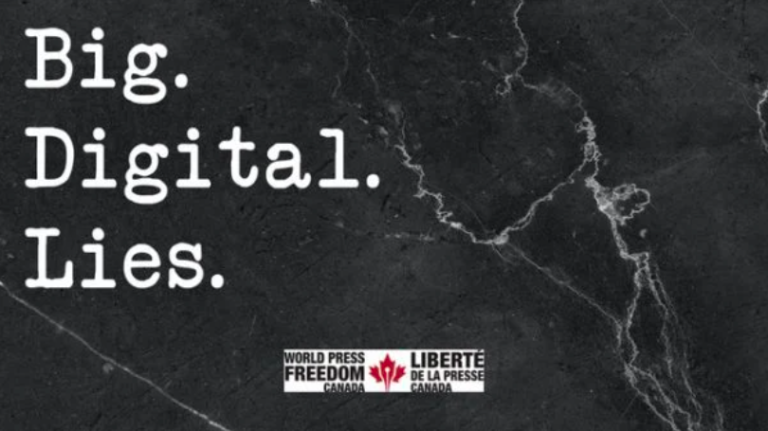This week’s highlights
- JHR helps put women leaders into headlines in the Democratic Republic of the Congo
- World Press Freedom Canada’s podcast on harmful communication on social media platforms
- JHR and Hot Docs co-present ‘SIEGED: THE PRESS VS. DENIALISM’
- An interview with 2019/2020 Fisher Fellow Nancy Emefa
- Apply Now to the Media Girlfriends Fellowships
Putting Women Leaders in Headlines in the
Democratic Republic of Congo
Photo Credit: JHR DRC
On January 27, 2021, the Congolese National Assembly voted to dissolve the government led by former Prime Minister Sylvestre Ilunga Ilunkamba. In February, president Felix Tshisekedi appointed a new prime minister, Jean-Michel Sama Lukonde. A month since his appointment, the prime minister has yet to announce his cabinet. The current government restructuring process presents an ideal opportunity to engage on increased female representation in the upcoming government. Only 17% of the recently dissolved government members were females, although the Congolese constitution guarantees gender parity in government.
In the past month, JHR has engaged key stakeholders such as decision-makers, CSOs, and the public to promote increased female representation in the upcoming government. On March 6th, JHR held a roundtable discussion on female representation in Kinshasa. It brought together six female Members of Parliament, all members of L’Union Sacré de la Nation (USN), a platform created by the current President that seeks to promote good governance practices. The roundtable also drew media managers, journalists, and women’s rights organizations such as the Permanent Framework for Consultation of Congolese Women (CAFCO) and the organization Rien Sans les Femmes. Among the participants was Mrs. Marie Josée Ekufu, an important female political figure in the DRC and former presidential candidate.
The round table’s overall objective was to assess women’s representation in the public and private sectors and to discuss strategies to ensure gender parity is respected in the upcoming government. During the session, female MPs committed to engaging fellow MPs and influential figures such as the first lady to improve women’s representation in the new government. They also committed to initiating bills to improve female representation in decision-making positions and counter impunity for SBGV.
At the end of the session, participants drafted and signed a petition asking the Prime Minister to respect gender- parity when forming the new government as prescribed by the constitution. The petition was officially handed to the Prime Minister after the roundtable. Participants also drew a press release that was shared with the media. The event was covered by the national broadcaster RTNC and several local media.
Two days after the event, on March 8th, 2021, The First Lady of the Republic, Denise Nyakeru Tshisekedi, met with the Prime Minister to champion gender parity in the upcoming government. Concurrently, throughout March, JHR produced over 30 on-air forums on female representation in government. The interactive on-air forums brought together CSO representatives, government officials, with a cumulative reach of over 30 million people.
On March 29th, after weeks of coverage on the issue of women’s representation, the Congolese press widely reported that the President had refused to sign on a new proposed government due to insufficient female candidates.
JHR intends to keep working with key stakeholders in the DRC to promote gender parity in decision-making in both the private and public sectors.
JHR partner World Press Freedom Canada on the need to regulate harmful communication
on social media platforms
Photo Credit: World Press Freedom Canada
Many Canadians get their news from the internet and navigate through a web that is polluted with disinformation and misinformation. What’s the impact of this on the people tasked with cutting through the noise? How do we get to the real facts?
JHR partner World Press Freedom Canada has teamed up with Ottawa journalist Sarah Turnbull to probe the issue in a podcast series, ‘Big Digital Lies’. The latest episode discusses the need to regulate harmful communication on social media platforms with former SCOC chief Justice Beverly McLachlin.
Take a listen here.
This May, JHR and Hot Docs co-present
SIEGED: THE PRESS VS. DENIALISM
 Still from ‘SIEGED: THE PRESS VS. DENIALISM’. Photo Credit: Hot Docs
Still from ‘SIEGED: THE PRESS VS. DENIALISM’. Photo Credit: Hot Docs
JHR is thrilled to co-present SIEGED: THE PRESS VS. DENIALISM from April 29 – May 9, at North America’s largest documentary festival, Hot Docs, taking place online this year due to public health restrictions.
The film looks at the way Brazilian president Jair Bolsonaro has used the covid-19 pandemic to attack the press, and how this undermined efforts to ensure Brazilians had the necessary public health information they needed to stay safe. The film’s synopsis:
As Brazil’s COVID-19 death toll soars, President Bolsonaro unleashes a relentless media campaign of misinformation, undermining the efforts of journalists desperate to inform a nation during the darkest months of the pandemic.
Tickets on sale now: http://ow.ly/JHBV30rDPXS .
An interview with Nancy Emefa: 2019/2020 Fisher Fellow
Nancy Emefa Dzradosi
2019/2020 recipient of the Fisher Fellow, Nancy Emefa Dzradosi, is a Ghanaian journalist who specializes in field reporting, anchoring and production. Her works focus on Human rights and the Environment. Nancy currently leads Joy FM and Accra Metropolitan Assembly’s Clean Ghana Campaign. In 2018 and 2019, her stories on abandoned lepers and a mentally pregnant woman reignited national conversation on social exclusion. Nancy has a bachelor’s degree in Sociology and linguistics from the University of Ghana. She lives in Accra, Ghana.
Click here to read JHR’s interview with Nancy Emefa on what the Fisher Fellowship offers her as a journalist and her plans for the future!
Apply Now to the Media Girlfriends Fellowships
Media Girlfriends is a podcast company, network & student scholarship. Media Girlfriends support women & non-binary journalists. They work to promote more perspectives in Canadian media, particularly those by Black, Indigenous and other people of colour. Media Girlfriends started as a podcast by Nana aba Duncan, currently a William Southam Journalism Fellow (see above) and formerly JHR’s country director in Ghana !
Journalism students: Apply for a new $10,000 CAD Media Girlfriends scholarship for Black high school students pursuing journalism at a post-secondary institution in Canada, and/or one of two $10,000 CAD Media Girlfriends scholarships for women/trans/non-binary students pursuing journalism, communications, media or tech. Deadline is April 30, 2021. More information, including how to apply, is at https://www.mediagirlfriends.
********************************
Land Acknowledgement
We wish to acknowledge the land on which the Journalists for Human Rights’ head office operates and recognize the longstanding relationships Indigenous nations have with these territories. For thousands of years it has been the traditional land of the Huron-Wendat, the Seneca, and most recently, the Mississaugas of the Credit River. Tkaronto (Toronto) is in the Dish with One Spoon Territory and is home to Indigenous peoples from many nations across Turtle Island who continue to care for this land today.
To read more on JHR’s land acknowledgement, click here.





